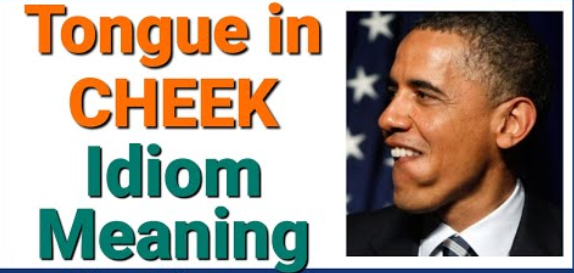(单词翻译:单击)
听力文本
Now, it's time for Words and Their Stories from VOA Learning English!
On this program, we explore the meaning and usage of everyday expressions in American English.
Today, we will talk about two parts of your head: the tongue and cheek. When you put them together, you get something funny!
A tongue-in-cheek comment or observation begins seriously but ends humorously. However, behind the playfulness is truth. So, tongue-in-cheek comments often get people thinking.

Tongue-in-cheek comments are often used in critiques. They tell something truthful, but in a light-hearted, funny way. You can sometimes get away with a lot by using tongue-in-cheek humor because the truth in it can sometimes be hard to recognize.
The American writer Mark Twain was an expert at making tongue-in-cheek comments.
Another famous humorist was Will Rogers. He was born in 1879 in what is now Oklahoma. He was part Cherokee and was known as "the cowboy philosopher."
Rogers' warm humor made him one of the best-loved performers of his generation. During his long career, Rogers did a little of everything. He was an actor, both in the theater and in movies. He had a weekly radio show and also wrote stories for a newspaper.
This tongue-in-cheek comment from Rogers is as meaningful today as it was when he said many years ago:
"Everything is changing in America. People are taking the comedians seriously and the politicians as a joke."
Now, we all know that no one can know everything. But that fact doesn't sound very interesting, funny or witty. Will Rogers stated that truth in his typical tongue-in-cheek way when he said, "Everybody is ignorant only on different subjects."
But how did putting your tongue in your cheek come to mean a kind of twisted, oftentimes truthful, humor?
Some websites say this expression dates back to the 18th-century England. One site says that it first meant a common facial expression used to express dislike or contempt. These days, the contempt is gone and in its place are terms like irony. An irony is when you say the opposite of what you mean, usually to be funny.
Another website says that people may have stuck their tongue in their cheek to keep from smiling or laughing.
However, when it comes right down to it, you should not take a tongue-in-cheek comment at face value. It starts to mean one thing but then ends by meaning something completely different. That is what makes it so funny.
Tongue-in-cheek humor is often successful when it includes the speaker in a funny critique or situation.
In 1962, President John F. Kennedy famously did this at a dinner celebrating 49 American Nobel Prize winners.
He said: "I think this is the most extraordinary collection of talent, of human knowledge, that has ever been gathered together at the White House ... with the possible exception of when (former President) Thomas Jefferson dined alone."
In this way, tongue-in-cheek humor can be self-deprecating. It is effective when you want to make fun of yourself a bit.
And this brings us to music.
For some reason, country and western music has a long history of producing tongue-in-cheek songs. With titles like "She Thinks My Tractor's Sexy,'" "Queen of My Double Wide Trailer" and "Bubba Shot the Jukebox," it is clearly a type of music that does not mind poking fun at its own culture and lifestyle.
In the 1970s, Mac Davis became one of the biggest names in country music. He wrote songs for Elvis. And because he was so handsome also got into acting. Then in 1974, he had everyone laughing with his tongue-in-cheek song making fun of his own life.
"It's Hard to Be Humble" became an instant hit.
"Oh Lord it's hard to be humble
When you're perfect in every way
I can't wait to look in the mirror
Cause I get better looking each day
To know me is to love me
I must be a hell of a man
Oh Lord It's hard to be humble,
But I'm doing the best that I can!"
And that's Words and Their Stories. Out of all the programs here at Voice of America, this is one of them. I'm Anna Matteo.
重点解析
1.get away with 逃避惩罚;被放过;侥幸做成
For such a serious offence he was lucky to get away with a fine.
他犯了那麽严重的过失,却侥幸只交罚款而逃过。
2.when it comes right down to it 归根结底,说到底,说来说去
When it comes right down to it, you are the only thing that is stopping you from achieving whatever it is your heart desires.
归根结底,实现愿望的唯一障碍是你自己。
3.face value 票面价值;面额;表面价值
But some psychologists are now beginning to ask if such studies can be taken at face value.
不过,一些心理学家开始问:“如果这种研究以更加浅显的形式进行呢?
参考译文
现在是VOA学英语《词汇掌故》节目时间!
在节目中,我们探索美式英语里日常表达的含义和用法。
今天,我们将探讨人头部的两个部位:舌头(tongue)和脸颊(cheek)。当你将这二者组合在一起的时候,你就会得到有趣的表达!
半开玩笑的意见或者评论(tongue-in-cheek comment or observation)始于严肃终于诙谐。但玩笑的背后是真理。因此,半开玩笑的意见常常引人深思。
“tongue-in-cheek comment”常常用在发表评论的时候。他们用一种轻松有趣的方式来表达一些真实的东西。有时,你可以用半开玩笑的方式逃避很多事情,因为玩笑中所包含的深意有时候很难被别人体会到。
美国作家马克·吐温是发表诙谐幽默评论方面的专家。
另一位著名的幽默作家是威尔·罗杰斯。1879年,他出生于现在的俄克拉荷马州。他有一半的切罗基人的血统且被称为“牛仔哲学家”。
罗杰斯的温情幽默使他成为他那一代时最受喜爱的演员之一。在他漫长的职业生涯中,罗杰斯什么都尝试了一点。他是一名剧场演员,也是一位电影演员。他每周会有一个电台节目,还为一家报社写小说供稿。
罗杰斯的这句幽默如今依然和他多年前说出这句话时一样意味深长:
“美国的一切都在改变。人们开始认真对待喜剧演员并将政客们当笑话看。”
现在,我们都知道,没人能知晓一切。这个事实听起来并不会十分有趣、幽默或是妙趣横生。威尔·罗杰斯用他特有的幽默方式陈述了这个事实,他说:“每个人都是无知的,只是科目不同而已。”
但是“将舌头放在脸颊”是怎么演变成表示一种变形的却往往真实的幽默的意思的呢?
一些网站说这个表达源于18世纪的英格兰。其中一个网站说它最开始作为一个常见的面部表达是用来表示“不喜欢”或者“轻蔑”的意思。如今,“轻蔑”的意思已经消失了,取而代之的是“irony(反话)”之类的词语。“irony”就是你说出和你想表达的意思相反的话,通常说反话是为了娱乐。
另一个网站说那些将舌头放在脸颊上的人有可能是为了避免微笑或者大笑。
但是,说到底,你不能将“tongue-in-cheek comment”解读为表面意思。开始,它表示的是一个意思,最后,它表示的是完全不同的含义。这造就了它诙谐的含义。
当这种半开玩笑的幽默把演讲者自己放到这种有趣的批评或状况中的时候,它往往会很成功。
在1962年,总统约翰·F·肯尼迪在庆祝49位美国诺贝尔奖获得者的晚宴上的半开玩笑式的幽默就做到了这一点。
他说:“我认为这是白宫有史以来最杰出的人才和人类知识的大集合……可能得除了托马斯·杰斐逊(前总统)在这单独用餐的时候。”
这种用法下的“半开玩笑式的幽默”可以表示自嘲。当你想拿自己开点玩笑的时候,这个表达很好用。
这就将我们引到音乐方面了。
出于某些原因,乡村和西部音乐有很长一段时间制作的是半开玩笑式歌曲。歌名如“She Thinks My Tractor's Sexy'(她觉得我的拖拉机很性感)、Queen of My Double Wide Trailer(我的双人宽拖车女王)以及Bubba Shot the Jukebox(布巴开了自动点唱机)”,显然,这是一种不介意取笑自己文化和生活方式的音乐。
在20世纪70年代,麦克·戴维斯成为乡村音乐界最知名的人之一。他为埃尔维斯(猫王)写歌。而且因为他长得如此英俊,也因此进入了演艺界。1974年,他的歌曲中有对他自己生活半开玩笑式的嘲讽,引得所有人开怀大笑。
“It's Hard to Be Humble(谦虚很难)”立即成为热门歌曲。
啊,主啊 ,要我 谦虚很难
你有没有在每方面都觉得很完美的时候
我等不及要照镜子
我每天都变得更好看
了解自己就是爱自己
我一定是一个很了不起的人
啊,主啊 ,要我谦虚很难
但我尽力在做
这就是今天的《词汇掌故》节目。这是所有美国之音的节目之一。我是安娜·马特奥。


